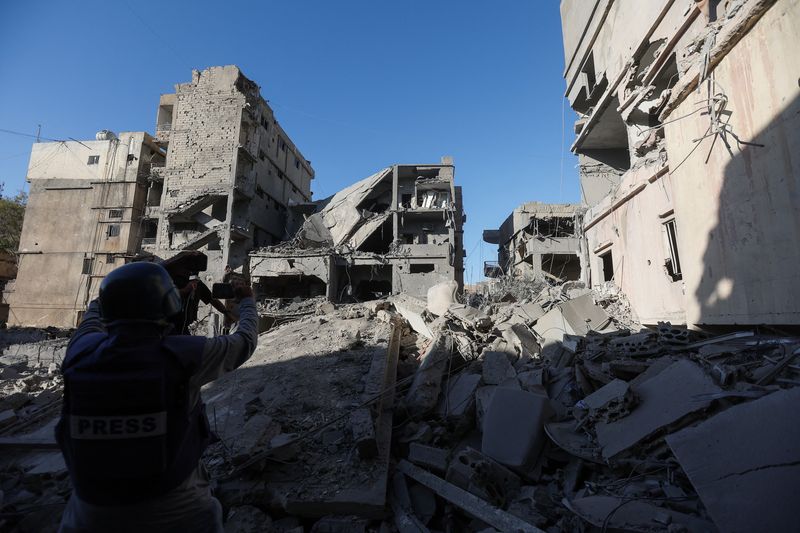By Maya Gebeily and Michelle Nichols
BEIRUT/NEW YORK (Reuters) - The war between Israel and armed group Hezbollah is expected to wipe 9% off Lebanon's national wealth as measured by GDP, the United Nations said on Wednesday, with the scale of hostilities and the economic fallout set to surpass the last war in 2006.
The U.N. Development Programme's rapid appraisal of the conflict's impact on Lebanon's gross domestic product was released a day ahead of a summit hosted by France to help drum up international support for Lebanon.
UNDP said it expected the conflict to last until the end of 2024, leading to a 30% jump in the government's financing needs in a country in dire straits even before violence began.
"GDP is projected to decline by 9.2% compared to a no-war scenario, indicating a significant decline in economic activity as a direct consequence of the conflict (around 2 billion dollars)," the report said.
UNDP said that even if the war ended in 2024, the consequences would persist for years, with GDP likely to contract by 2.28% in 2025 and 2.43% in 2026.
Lebanon was already suffering a four-year-old economic downturn and a political crisis when Hezbollah began firing rockets at Israel last year in support of its Palestinian ally Hamas.
In late September, Israel dramatically ramped up its bombing across Lebanon, with strikes now regularly hitting Beirut's southern suburbs, major cities in southern Lebanon and parts of the eastern Bekaa Valley, including the border with Syria.
Hezbollah and Israel last fought in 2006, when a month-long conflict left much of Lebanon's south and the capital's southern suburbs in ruins and required international help to rebuild.
UNDP said the damage to physical infrastructure, housing and productive capacities like factories would likely be close to that estimated for the 2006 war, which was between $2.5 billion and $3.6 billion. But it warned of larger overall damage to Lebanon.
"The scale of the military engagement, the geopolitical context, the humanitarian impact and the economic fallout in 2024 are expected to be much greater than in 2006," it said.
UNDP's report said the closure of border crossings critical for trade would bring a 21% drop in trade activities, and that it expected job losses in the tourism, agriculture and construction sectors.
It said Lebanon had already sustained "massive environmental losses" over the last year, including due to unexploded ordnance and contamination from possibly hazardous material, particularly the use of white phosphorus across southern Lebanon.
Government revenue is expected to fall by 9% and total investment by more than 6% through both 2025 and 2026.

As a result, increased international assistance will be essential for sustainable recovery in Lebanon, UNDP said - not only to address the spike in humanitarian needs but to stem the long-term social and economic consequences of the conflict.
Lebanon's minister in charge of its crisis response told Reuters that the country needed $250 million a month to help more than 1.2 million people displaced by Israeli strikes.